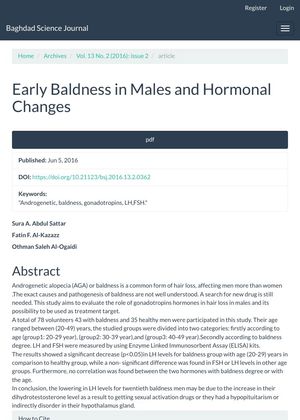TLDR Young men with early baldness may have lower Luteinizing Hormone levels due to higher dihydrotestosterone, possibly linked to certain drugs or gland disorders.
The study "Early Baldness in Males and Hormonal Changes" conducted in 2016 involved 78 male participants, 43 of whom were experiencing baldness and 35 who were not. The participants were divided into three age groups: 20-29, 30-39, and 40-49 years old. The study aimed to evaluate the role of gonadotropin hormones in male hair loss. The results showed a significant decrease in Luteinizing Hormone (LH) levels in the baldness group aged 20-29 years compared to the healthy group. However, no significant difference was found in Follicle Stimulating Hormone (FSH) or LH levels in the other age groups. Additionally, no correlation was found between the two hormones and the degree of baldness or age. The study concluded that the decrease in LH levels in younger men with baldness could be due to an increase in their dihydrotestosterone level, possibly as a result of taking sexual activation drugs, hypopituitarism, or an indirect disorder in their hypothalamus gland.
February 2023 in “Research Square (Research Square)” Autologous Cellular Micrografts effectively treat hair loss with significant improvements and no dangerous side effects.
3 citations
,
May 2020 in “Journal of The Korean Medical Association” Minoxidil and finasteride are effective for treating hair loss, with dutasteride showing potential but with side effects.
 1 citations
,
January 2015 in “Springer eBooks”
1 citations
,
January 2015 in “Springer eBooks” AGA is a common hair loss disorder, and early diagnosis and treatment with minoxidil or finasteride can help reduce emotional distress.
November 2014 in “PharmaTutor” Finasteride may help postmenopausal women with hair loss but is not effective for all and should be used cautiously in premenopausal women.
February 2012 in “Dermatology Times E-News” Finasteride helps men grow more hair and lose less.
January 2009 in “Revista de Ciências Médicas” Male pattern baldness is a genetic condition causing hair loss, with limited but improving treatment options.
 10 citations
,
June 2001 in “PubMed”
10 citations
,
June 2001 in “PubMed” Finasteride is effective in growing hair and stopping hair loss in men with mild to moderate alopecia.
 2 citations
,
October 1997 in “Dermatologic Clinics”
2 citations
,
October 1997 in “Dermatologic Clinics” The document concludes that advancements in hair restoration surgery have led to more natural results and patient satisfaction, with hope for future improvements in treatment.
48 citations
,
April 1982 in “Clinics in Plastic Surgery”




